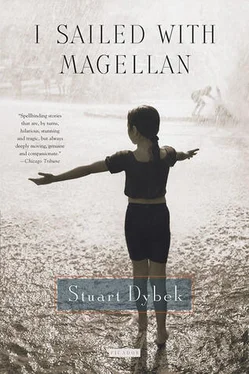Probably peeping at someone, paintbrush in one hand and dick in the other, he lost his balance, I wanted to say.
And I might have, had I already heard her other stories.
They were all about firsts: that first real sexual experience, with Armando; the first time naked with a boy in a hotel room (that was at the state forensic finals in Dayton, and the boy, a forensic powerhouse known and feared as Motormouth, turned out to be more awkward and shy than she was); first time with a woman — Maria, a defector from Hungary, who was hired as the gymnastics coach at the all-girl Catholic high school during Melody’s junior year there, which, in a weird way, led to her first time with a divorced man — the Laingian psychotherapist to whom she was sent during the scandal about the gymnastics coach, which had ensued after Melody’s mother read the diary in which Melody recorded the entire lesbian encounter with Maria from the date of their first seemingly innocent back rubs.
After that, Melody stopped keeping a diary.
There was a price to pay in all her stories. The therapist, she said, simply went missing one day — later they learned he’d disappeared into a religious cult — and the overmatched naked boy in the hotel room won state and went on to nationals, only to crack during the finals and attempt suicide.
“What about that teacher who wrote about sarcasm on your paper?”
“What about him?”
“Did he die, too?”
“What’s that supposed to mean?”
“Accidents, death, deportation, disappearances, madness, suicide, and all that before Chapter One. Some prologue. It doesn’t bode well for me.”
“I wouldn’t worry,” she said. “You’re obviously a survivor.”
“I’m just glad it’s a novel and not a diary we’re talking about.”
“I guess I shouldn’t have told you.”
“Hey, I never said I didn’t like listening to your stories.”
“I’m sure. What’s to like anyway?”
“I like the line from your high school teacher. I like the one about how, after the first time a girlfriend described oral sex to you, you had a dream about it so intense you woke and, gymnast that you were, tried having auto-oral sex.”
“I told you that?”
“Remember? That afternoon I had the jug of Paisano courtesy of my friend Doolin?”
“Damn that Doolin and his Paisano! Sicilian LSD. God! Why do I tell you such things?”
“To drive me crazy?”
There’d been a knock one night, too late to be Melody. A little late even for Stosh.
When I opened the door, Doolin, returned from Europe, stood there holding two enormous jugs of Paisano the way a traveler stands balanced between suitcases.
“I heard you were back,” he said, stepping in, looking around appraisingly. “Very minimal, very understated.”
“I’ll give you the grand tour: and this is the kitchen.”
“A little breezy, no? But I love the way that tree branch is growing in through the window. Good place to hang your hat.”
Which, in Doolin’s case, was a beret. His worn gray corduroys were now supported by a pair of green suspenders. He’d only just returned to Chicago himself, he said. Europe had wiped him out financially, and for the time being he was living at his mother’s.
“Man, you should of come,” he said. “You’d have loved it. Winding cobbled streets out of a Pisarro painting. You got any glasses around here?”
“They’re on back order.”
We sat, backs to the wall beside the window, passing the gal-Ion jug of thick, dark Paisano. With each swig, wine dribbled down Doolin’s red beard and beaded off the chin hairs onto the frayed collar of his shirt. He was telling me about Paris, about visiting Debussy’s house off the Avenue du Bois de Boulogne, as I’d asked him to; and he’d gone to Debussy’s grave as well, at the cemetery at Passy, and left a flower for me. Then, after Paris, it was on to Rome, riding the train that runs along the coast past Nice, and Bordighera — names of fantasy places picked up from the paintings we’d stood before at the Art Institute, breathing as if we could inhale their atmosphere.
“I got off at Rapallo because Pound went crazy there.”
Outside, an El streamed by, a strip of blue-lit film.
It was on the train through Italy, Doolin said, after the stop at Rapallo, that the flash of a single word came to him like a revelation and he realized it was the name of a literary magazine that he had to start: Obscurity.
“Hmmmmm,” I said, but not enthusiastically enough.
“You don’t think Obscurity says it all?” Doolin asked. “What’s missing? That certain je ne sais quoi? ”
I shrugged. We’d been drinking excitedly, too fast, but still weren’t halfway through the first jug, though it had grown easier to heft. “What are you working on?” I asked, changing the subject.
“Mayakovsky,” Doolin said, “ A Cloud in Trousers. A new translation for our generation.”
Back braced against the wall, he slid up to a standing position to recite, the slightest hint of a Russian accent edging into his voice:
The world breaks into a cold sweat
when I roll out of bed and bellow,
I’m twenty-two.
Get off the street, motherfuckers.
“That’s Mayakovsky?”
“Is now.” He unzipped his fly and took a leak out the window. “Very convenient setup you have here, Perry,” he said and began pacing.
When I stood, the Paisano hit me, and I could see why Doolin was pacing. It kept him from staggering. He paced to the typewriter on the living room floor, ripped out the sheet I’d been typing when he knocked, and read aloud in the booming Welshinflected tones of a Dylan Thomas record:
Chapter 1: You, me, a secret concealed like a baloney-and-cheese sandwich smuggled in a secretary’s purse as she rides the express to work, something she wants to devour now, that makes waiting for lunch impossible — I’m famished like that, or as you say ravished, when you mean ravenous, and lunch turns out to be a kiss that leaves a speck of mustard on your lips …
“Perfect for Obscurity,” Doolin said. “I’ll be your first publisher. You’ll be in good company with Mayakovsky.”
We slammed out of my door and with what was left in the first jug of Paisano sloshing between us staggered down the back stairs and out the alley entrance. The pavement seemed unsteady, pitted like the face of the moon; the alley, a narrow Parisian back street — the rue de Lune. A glint beneath a streetlight caught my eye.
“A good-luck penny!” I said, stooping for it. “One cent closer to making the rent.” A Rasputin-looking Lincoln stared up from my palm.
“Let’s make a wish,” Doolin said and grabbed, knocking the coin from my hand. We watched it roll along the gutter and down a sewer.
On Columbia Beach, whitecaps blew in, atomized spindrift misted like drizzle above the breakwater. We passed the Paisano, having to yell over the racket of waves. Wine and words both tasted of grit. “Who’s the woman in Chapter One?” Doolin shouted.
“A gymnast named Natasha. She defected … from Ohio.”
“I got it!” Doolin cried.
“Got what?”
“Obscurity and a Penny.”
“You said,” she wrote to me one day, “that you won’t feel you really live here until you get a letter. Will a story about a journey to which a woman has become somewhat addicted do? I could draw a map with the stops at the stations along her way: Howard, Jarvis, Morse — good English butler names — but a map wouldn’t tell how far she really travels, or how it feels to wait at the edge of sunlight on a wooden platform in the company of pigeons to board the train.
“Hello again, she tells the pigeons. Hello again, she tells herself.
Читать дальше












